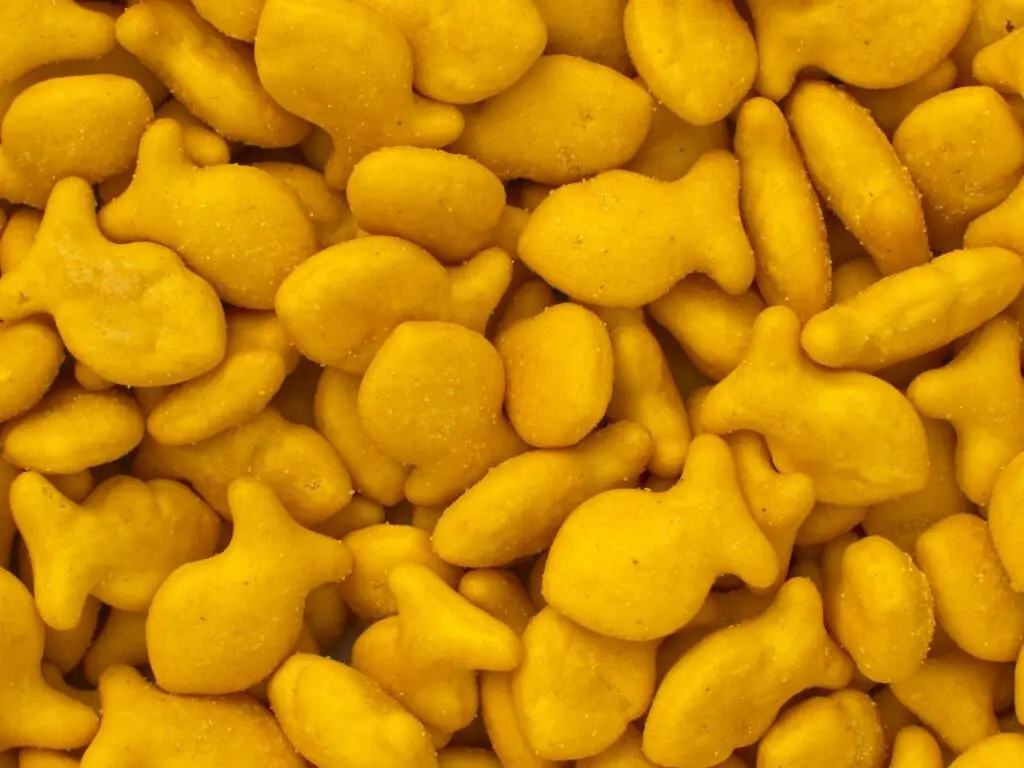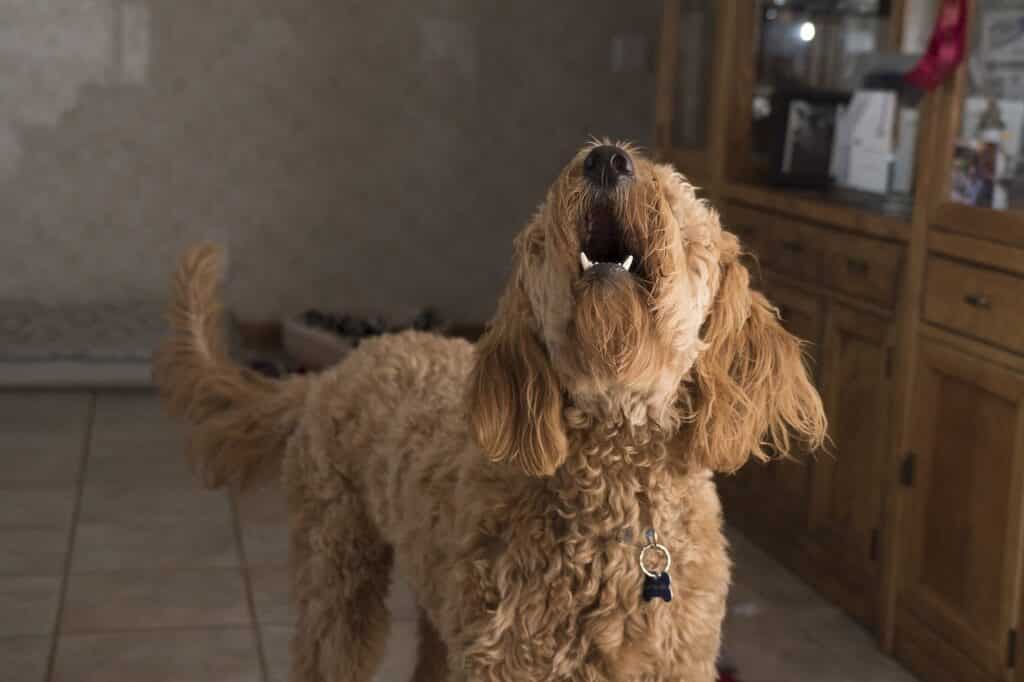Goldfish crackers are known for their cheesy, salty taste.
You may think of taking some from your snack stash and giving it to your dog, or maybe they fell on the floor, and your dog found a free treat.
This raises the question, can dogs eat Goldfish crackers?
No, dogs can’t eat Goldfish crackers.
They contain ingredients that are toxic and unhealthy for dog consumption.
Although a dog can handle a few Goldfish crackers, this shouldn’t become a regular thing.
Since Goldfish crackers are shaped like fish and are tempting to dogs, they may find ways to get some.
Read on to find out why dogs can’t consume this snack and what you can do if they do.

Which ingredients in Goldfish crackers are harmful to dogs?
Goldfish crackers contain ingredients that are harmful to dogs.
These include:
Salt: One serving of Goldfish crackers contains 250 mg of salt. If your dog consumes excessive amounts of the snack, it can suffer from dehydration and sodium ion poisoning. Your dog will exhibit fever, seizures, swelling, depression, vomiting, and diarrhea symptoms.
Onions: Goldfish crackers contain onion powder which is toxic to dogs. It damages their red blood cells, leading to anemia. 100grams of onion per 20kg weight of a dog is enough to cause toxicity. When your dog contracts onion toxicity, it will exhibit symptoms such as loss of appetite, pale gums, lethargy, and fainting.
Garlic: Goldfish crackers contain garlic seasoning, which is toxic to dogs. It contains thiosulfate, a compound that damages red blood cells in dogs, leading to hemolytic anemia. Some common symptoms of garlic toxicity include jaundice, anemia, lethargy, weakness, and rapid breathing.

How can you tell that your dog has eaten excess Goldfish crackers?
Some signs confirm that your dog has eaten Goldfish crackers in large amounts.
The signs are a dog’s reaction to the ingredients in the snack.
These include:
Heavy panting: Check if your dog’s breathing is normal. If it’s heavy, the chances that it consumed excess salt in the Goldfish crackers are high.
Difficulty walking: A dog may experience difficulty walking from consuming Goldfish crackers due to the toxic ingredients in the snack.
Diarrhea and vomiting: These signs indicate that your dog ate an excessive amount of the snack, affecting its stomach.
The toxicity of these ingredients depends on the size of your dog.
While a few pieces of Goldfish crackers can harm a small dog, the same amount causes no effect on bigger dogs.
Do Goldfish crackers add any nutritional value to dogs?
Other than the toxic ingredients in Goldfish crackers, it’s best to understand the snack’s nutritional value and its impact on dogs.
High carbohydrate: Goldfish crackers are a high-carb snack. A dog’s diet should consist mainly of protein. Regardless, carbs from vegetables and fruits benefit dogs more than those from grains such as wheat. Since a dog’s digestive system can’t process grains, it converts them into sugar.
Gluten: The gluten from wheat found in Goldfish crackers is toxic to dogs. Eating this snack will trigger an allergy if a dog is allergic to gluten. It causes diarrhea, itchiness, redness, skin irritation, and vomiting.
Sugar: Goldfish contains sugar, a toxic substance to dogs. Excessive sugar consumption increases blood sugar levels, weight gain, and obesity-related conditions such as cancer and liver and heart diseases.
What should you do when your dog consumes Goldfish crackers in excess?
When you find out that your dog has eaten this snack in excess, take the following measures:
- Examine the ingredients of the Goldfish crackers and find out the amount consumed.
- Feed it plenty of water to curb dehydration. The excess salt in the snack leads to dehydration, and if your dog has no access to water, it can die.
- Don’t attempt to induce vomiting to get rid of the toxins from the dog’s system unless advised by a veterinarian. This can worsen the situation because it can lead to aspiration pneumonia.
- Consult a veterinarian if the symptoms worsen because it could indicate poisoning. The veterinarian will induce vomiting and provide medication to stop the condition from worsening.
Can Goldfish crackers kill dogs?
When you discover that your dog has consumed Goldfish crackers, especially large quantities, consult a veterinarian immediately.
If your dog contracts poisoning from the ingredients in the snack, immediate treatment will help restore its health.
Goldfish crackers can kill dogs.
If your dog contracts onion, garlic, or salt poisoning from the ingredients in the snack without receiving immediate treatment, the symptoms will worsen and can lead to death.
Small Sized dog breeds are at a higher risk of dying from consuming a small amount of Goldfish crackers, unlike bigger ones.
How do you prevent your dog from begging for Goldfish crackers?
Dogs can be manipulative, especially when it comes to food and snacks.
Their sad eyes can convince you to give in to their begging.
Below are tips you can use to avoid the situation.
Training: By training your dog to adhere to your commands, you’ll have it under control, and you can say no when it begs for a snack. It’s easier to train puppies, but if your dog is older, start the training and make it a habit.
Keep your dog busy: Before eating the snack, keep it occupied by allowing it to play with toys in another room or outside. Although hiding food isn’t a good option, in this case, it’s for the best. You’ll enjoy your Goldfish crackers, and your dog won’t know it’s missing out.
Feed your dog healthy snacks: Instead of feeding your dog Goldfish crackers, choose healthy dog treats or fruits and vegetables
Conclusion
However tasty, you shouldn’t feed your dog Goldfish crackers.
It’s toxic and has no nutritional value to dogs.
The ingredients cause poisoning to dogs and can lead to death if not treated immediately.
If your dog consumes the snack, check it for any unusual symptoms, then consult a veterinarian.
Next time you wish to feed your dog a snack, choose a healthy alternative that will give it essential nutrients.
- What Dog Breeds Have Pink Skin? - March 24, 2023
- What Are the Most Inspiring Dog Breeding Quotes? - March 20, 2023
- Can Pheromone Spray Help Improve Dog Breeding Results? - March 19, 2023








